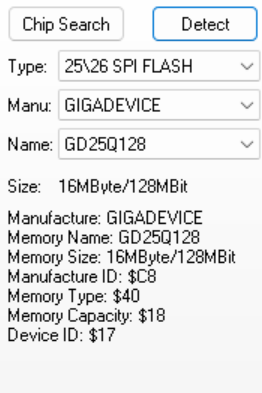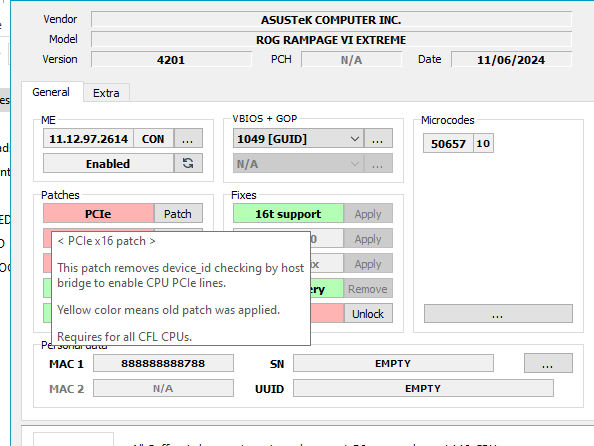Hello,
Considering i hit (ctrl+f) and only saw 1 entry for Dell, shall i assume this hack is still ONLY for Asrock boards?
I have a Dell Optiplex 7450 AIO id VERY much be interested in doing this with… But yet, its 4 cores max still… Correct?
Hello,
Considering i hit (ctrl+f) and only saw 1 entry for Dell, shall i assume this hack is still ONLY for Asrock boards?
I have a Dell Optiplex 7450 AIO id VERY much be interested in doing this with… But yet, its 4 cores max still… Correct?
Hello,
I created a bios mod file according to the instructions for the motherboard B365M
Phantom Gaming 4 but after flashing, I turned on the computer for about 5 seconds and then turned off. The DDram led lights up in the check led strip and stops there, after about 2 seconds the computer turns off. Before that, I created a bios mod file for the motherboard B250m gaming 3 and flashed it with CH341 successfully, used it for 2 years without any problems. My CPU is shared with the 2 motherboards above, QNCT 6C12T MIDIFIED LAPTOP.
Please help me create another bios mod file. Because I don’t know what I did wrong, after trying to create many different bios mod files but the result is still the same. Thanks you.
@JUMP Some ASRock boards have BIOS protection (Flash Descriptor writing being blocked). You should make sure that the ME firmware on the motherboard was actually downgraded.
Do you you have a Skylake or Kaby Lake CPU you can test the modified BIOS with to check the ME firmware version currently on the board?
You may need to use the CH341A to get past the BIOS locks.
I have i3-9100f cpu to test. After I flashed my B365M
Phantom Gaming 4 motherboard using CH341 with NeoProgrammer 2.1.0.19 software. I went into bios and saw ME firmware is 0.0.0.0 as shown in the picture.
I am pretty sure I overwrote bios mod bypassing BIOS protection.
@JUMP There are many changes that need to be made to the BIOS to get Coffee Lake CPU’s to work on a B365 chipset, what software are you using to modify the BIOS?
Can you link to the original BIOS and also upload your modified BIOS here so that it can be examined?
To get the BGA1440 CPU to work with that motherboard you may want to contact the person that sold you the CPU and ask if they can send you a working BIOS.
I used CoffeeTime 0.99 to mod the BIOS.
Orginal Bios: 16 MB file on MEGA
Mod Bios: File on MEGA
I bought it a long time ago so I don’t have the seller’s information anymore.
@JUMP The modified BIOS looks correct:
908EA microcode present
ME Corporate Firmware 11.7.0.3307 and set to disabled.
PCIe patched for BGA1440
There is a knowledgeable member of this forum who may be able to help you if the problem is the BIOS mod, so I will tag @dsanke to ask if they could please check that the BIOS mod is ok.
How did you flash the modified BIOS? desolder BIOS chip, SOP-8 clip or SPI header?
There have been reports of problems using the CH341A with some ASRock boards such as this thread:
[CH341a Problem] Which bios_ph1 Cable for ASRock Z270 Pro4?
And also QNCT CPU sellers on Aliexpress:
If your motherboard is ASRock, please do not use CH341A programmer. The programmer has unknown bugs.
@JUMP As the motherboard booted with the i3-9100f the CH341A may have flashed ok - did you verify the BIOS chip after flashing?
Hopefully dsanke will take a look when he has a moment.
Hi, I have an issue with the stability of my system in the context of a Coffee Lake mod. I am using an ASUS G20CI (an SFF PC with a non-standard mainboard and Intel H270 chipset, used specifically in this model) which was equipped with an i7-7700 (non-K, 65 W TDP) and 1x 8 GB DDR4 SODIMM with up to 2133 MT/s by the manufacturer.
I replaced it with an i9-9900K (SRG19, 95W TDP), which is operated like an i9-9900 (non-K, 65 W TDP), so it matches well with the existing cooling solution, power supply and VRM. I chose the K variant due to its better availability and small advantages (the heatspreader is soldered instead of connected using thermal paste, which means the CPU die is better cooled).
Regarding the RAM, I took the largest possible option (two DDR4 SODIMM, 32 gigabytes each, specified up to 3200 MT/s). I have a strange issue with these. First I used them with the i7-7700 (2x 32 GB @ 2400 MT/s) and everything was fine. I had already modified the BIOS/UEFI (with CoffeeTime 0.99), so I only changed the CPU. With the i9-9900K there were repeated crashes, mostly while running some applications.
I found the following correlation:
(1) i7-7700 + [2x 32 GB @ 2400 MT/s] => stable
(2) i9-9900K + [2x 32 GB @ 2666 MT/s] => unstable
(3) i9-9900K + [2x 32 GB @ 2400 MT/s] => unstable
(4) i9-9900K + [2x 32 GB @ 2133 MT/s] => unstable
(5) i9-9900K + [1x 32 GB @ 2666 MT/s] => stable
For (3) and (4) the memory clock was lowered in BIOS/UEFI using the “Maximum Memory Frequency” option (this option is also used by CoffeeTime 0.99 when using “Extra > NVRAM > Default RAM frequency”). For the others, it was set automatically by the BIOS/UEFI.
These are the modules I use (Lexar LD4AS032G-3200ST), they are both the same model and were purchased together. The operating system recognises them correctly and reports 64 gigabytes as total memory size. One channel per module is used on the mainboard, which means each module is connected directly to the CPU socket with separate signal lines (therefore interference like with two modules on one channel cannot occur).
It seems strange that two modules are stable with the i7-7700, but the i9-9900K has issues with the same configuration, even at a lower clock rate. In addition, a single module is stable even at a higher clock rate with the i9-9900K… So why are two modules such an issue? If anyone experienced similar issues or has further knowledge, I would be grateful for advice.
Hi guys,
Was wondering if there is a coffelake cpu out there that does not require pin shorts to work? I have an Asus Apex IX modded to Apex X Dsanke mod that I brushed off the cob webs and seems stable with a 6700k. Thats all good and well except no Win 11 compatibility. Prior I had a 9700K that worked until system started to lock up and stutter until bios locked up on me. So pulled the 9700K and using it at work but wonder if the Z270 Asus Apex board is still able to handle a coffeelake cpu? Not as a gaming rig or anything just something to do office work on. What do you guys recommend? I could roll back the bios mod as all my regions are unlocked but again Windows 11 support is big on my wishlist. What do you think?
Thanks
@dsanke Your thoughts?
Hi guys,
I have an Asus z170-a with a removable DIP8 chip, the original Asus BIOS chip (ver 2202), a QTJ1 from aliexpress, vendor provided DIP8 BIOS chip (did not work. contents backed up).
I’ve been flashing the vendor provided chip using a CH341a (CH341A.exe 1.18). I’ve tried a bunch of different configurations using Asus BIOS versions 3802 or 3504 as base file. The machine can POST and boot with a coffeetime BIOS and 6600k (unless I unlock fd locks. In which case, machine only POSTs with no sata devices connected otherwise it’ll loop turning on and off.) but not with the QTJ1. I can’t even get it to POST let alone enter BIOS or boot.
With the QTJ1, the machine appears to power on but no POST lights or video signal. It’ll do the same thing even if the machine has no ram. The only time it’ll behave differently is if no BIOS is connected or the chip is blank, then it’ll loop powering on and off. Even a BIOS that would trigger an on-off loop with the 6600k would no-POST power on with the QTJ1.
Any idea what I should try next? I’m thinking I have a bad CPU/interposer. I couldn’t find anyone else with this issue. Thank you in advance.
@neigh64 Did you try the original BIOS chip that came with the board with the vendor provided BIOS? (I would back it up first of course).
You didn’t state what either of the two BIOS chips are (Winbond? Macronix? GigaDevice? etc) so it’s hard to determine if it is a problem with the vendor supplied chip.
Did you verify the contents of the vendor chip after writing to it?
I’m scared of overwriting the original BIOS chip so I haven’t tried that yet but I do have a back up of both chips in their original state.
CH341A.exe v1.34 recognizes both chips as Gigadevice GD25Q128. On the Asus chip I can see lettering “GD25B128CPIG E66076 AH1622”. On the vendor chip “GD25B128CPIG E63461 AH1536”. Both have the gigadevice logo. Both Asprogrammer and CH341a.exe (v1.18 up to v2.2) only reference GD25Q chips in their chiplist.xml files (not GD25B).

I made sure to verify my chip after each write to chip and after each back up creation (also made sure to reset CMOS via battery between tests). I’ve attached the vendor’s BIOS file and screenshots of the settings coffeetime recognizes. Seems the vendor is using BIOS v3802. vendorbios.zip (8.9 MB)
I’ve read about other people having issues with certain CH341a softwares not properly flashing (not clearing chip memory properly). Should I try using Asprogrammer even if I got the same issues using CH341a.exe v1.34 and v1.18? Thank you!
@neigh64 Check this post by Nastojka that specifically mentions using AsProgrammer_1.4.0.zip for GD25B128CPIG.
It’s worth a try.
Hello ALL i have one question about what is on coffeetime 0.99 the pcie patch like this

thank you
@panosxidis
I have moved your request into this already existing thread about a similar topic.
Look >here<.
Hi guys,I’m trying to run the Intel QTJ1 on my Lenovo m910x but so far no success.
After patching the bios with CoffeeTime and flashed with a programmer the motherboard is just completely dead and it only pulls 3.3W from the power supply so i measured the voltage at the VRM inductors and it’s 0V so the motherboard is not giving any voltage for the CPU to work which to me looks like a hardware issue most likely related to the BGA to LGA interposer thats connects the CPU to the board.
Of course if i use the i5 7500 that comes with the motherboard everything works fine so i’m either doing something wrong or this QTJ1 is just DOA and here are my coffeetime settings:
IME 11.8 is to new; you have to select a lower IME 11.7